|
|
|
Sort Order |
|
|
|
Items / Page
|
|
|
|
|
|
|
| Srl | Item |
| 1 |
ID:
131226
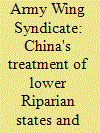

|
|
|
| 2 |
ID:
127771
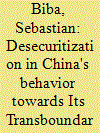

|
|
|
|
|
| Publication |
2014.
|
| Summary/Abstract |
Fresh water has no substitute, and its availability has been declining sharply around the globe. In Asia, China's role as a multidirectional and transborder water provider is unmatched. Analysis of China's behavior towards its transboundary rivers is therefore pivotal. By examining three different case studies-the Mekong River in Southeast Asia, the Brahmaputra River in South Asia and the Irtysh and Ili Rivers in Central Asia-this article seeks to lay the theoretical groundwork for understanding China's behavior. It pits previously applied realist rationales against the more recent notion of desecuritization strategies and makes a case for the latter. While desecuritization implies non- or de-escalation, it does not necessarily mean genuine long-term cooperation. The future of Asia's shared waters may thus be a contentious one.
|
|
|
|
|
|
|
|
|
|
|
|
|
|
|
|
| 3 |
ID:
103643


|
|
|
|
|
| Publication |
2011.
|
| Summary/Abstract |
Political contours changed little in Laos during 2010, leaving its single-party system in place. The economy continued to grow quickly, although not in ways that uplifted ordinary citizens. And deepening relations with China encouraged the government to open new channels to the United States.
|
|
|
|
|
|
|
|
|
|
|
|
|
|
|
|
| 4 |
ID:
123292
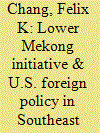

|
|
|
|
|
| Publication |
2013.
|
| Summary/Abstract |
Begun in 2009, the Lower Mekong Initiative (LMI) is now America's foremost engagement vehicle on the Indochina peninsula of Southeast Asia. From the outset, its most concrete aim was to facilitate an integrated water management scheme for the lower Mekong River, where plans to harness the river's hydroelectric potential as a catalyst for economic development have clashed with more traditional uses of the river. But more broadly, the LMI also serves a larger American goal: to encourage regional cohesion and thereby slow the spread of Chinese influence. Whether the LMI achieves these aims largely depends on how successful its member countries- including the United States and all of Southeast Asia's riparian countries-are in putting to rest the differences over how best to balance the various uses of the Mekong River.
|
|
|
|
|
|
|
|
|
|
|
|
|
|
|
|
| 5 |
ID:
075655


|
|
|
| 6 |
ID:
158749


|
|
|
| 7 |
ID:
174811
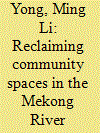

|
|
|
|
|
| Summary/Abstract |
In Northern Thailand's Chiang Khong district, which lies along the banks of the Mekong River and the Thai‐Lao border, an community‐based environmental movement under the leadership of the Rak Chiang Khong conservation group emerged in response to processes that have appropriated territories traditionally used by locals for state‐led economic exploitation. The Rak Chiang Khong has put up fierce opposition to large‐scale development projects such as the China‐led navigation project, which planned to blast ecologically and culturally significant rapids, and hydropower dam development along the Mekong River. As a result, local‐level governance arrangements of the transboundary commons in Chiang Khong have shifted to counter threats both within and beyond the borders of Thailand. Through adapting fishing arrangements, engaging in community‐led research and establishing village conservation zones, overlapping forms of territorialisation have emerged in response to socio‐ecological changes to the river. These new forms of territorialisation are produced by complex configurations of political, cultural, and ecological histories, politicaleconomic changes, and transboundary dynamics. These territorial strategies have been key towards reclaiming the transboundary commons of the Mekong River for riparian communities, and providing a deeper understanding of the values that drive community involvement in the transboundary environmental governance of the Mekong River.
|
|
|
|
|
|
|
|
|
|
|
|
|
|
|
|
| 8 |
ID:
127770
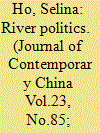

|
|
|
|
|
| Publication |
2014.
|
| Summary/Abstract |
China manages its transboundary rivers as a subset of its broader relations with other riparian states. This results in discernible differences in the way China approaches its international river systems. Although there is a limit to the extent of Chinese cooperation, in relative terms China is more cooperative in the Mekong than in the Brahmaputra. To China, Southeast Asian states are part of a hierarchical system where it stands at the apex. While problems exist, there are deep linkages between them, which help foster collaboration in the Mekong. India, which has greater power parity with China, is not part of China's hierarchical worldview. The territorial disputes and security dilemmas that characterize South Asian geopolitics further impede cooperation. Domestic considerations also impact on China's river policies. There is greater consensus among Chinese policymakers in managing the Mekong than the Brahmaputra, which explains the higher degree of clarity in Chinese policies towards the former compared to the latter.
|
|
|
|
|
|
|
|
|
|
|
|
|
|
|
|
| 9 |
ID:
090177
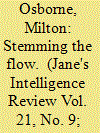

|
|
|
|
|
| Publication |
2009.
|
| Summary/Abstract |
Thirty years ago the Mekong River, South-east Asia's longest, flowed freely for 4,900 km from its source in Tibet to the Coast of Vietnam.The Mekong is the world's 12th longest river and eighth or 10th largest in terms of volume of water discharged, depending on the season, and it passes through or alongside china, Myanmar, Laos, Thailand, cambodia and Vietnam.
|
|
|
|
|
|
|
|
|
|
|
|
|
|
|
|
| 10 |
ID:
123513
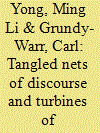

|
|
|
|
|
| Publication |
2012.
|
| Summary/Abstract |
Hydropower development on the mainstream of the Mekong River in the Lower Mekong Basin (lmb) has become one of the most pressing issues on the development agenda, being touted as the way forward in solving energy, development and sustainability needs in the region. Despite dominant and compelling arguments in favour of such development, a growing anti-dam lobby has taken to arguing that hydropower development will threaten the economic, social, environmental and food security of some 62 million people living in the lmb. The anti-dam lobby comprises a heterogeneous assemblage of actors, agencies and networks, working to provide critical and alternative geographical (re)imaginations of the lmb. This paper explores these multiple perspectives afforded by the anti-dam lobby through the lens of knowledge production. The anti-dam lobby, it will be seen, engages in a politics of legitimacy and re-scaling with the pro-hydropower lobby, played out through varying strategies, while highlighting urgent and critical knowledge gaps which need to be taken seriously for future development in the lmb.
|
|
|
|
|
|
|
|
|
|
|
|
|
|
|
|
| 11 |
ID:
089917
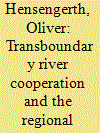

|
|
|
|
|
| Publication |
2009.
|
| Summary/Abstract |
The article compares three cooperation projects in the Mekong River basin: the Greater Mekong Subregion, the Quadripartite Economic Cooperation initiative and the Mekong River Commission. It analyses the three projects by asking if and how they produce a regional public good. Part of the public good discussion is participatory governance, which, in natural resource management, has become a prominent proposal for enhancing the efficiency of resource management by involving all relevant stakeholders. The central question is whether participatory governance leads to the avoidance of conflict, better resource management, and thus the creation or maintenance of a regional public good. The article will address the relevance of these concepts for watershed management of the Mekong River.
|
|
|
|
|
|
|
|
|
|
|
|
|
|
|
|
|
|
|
|
|